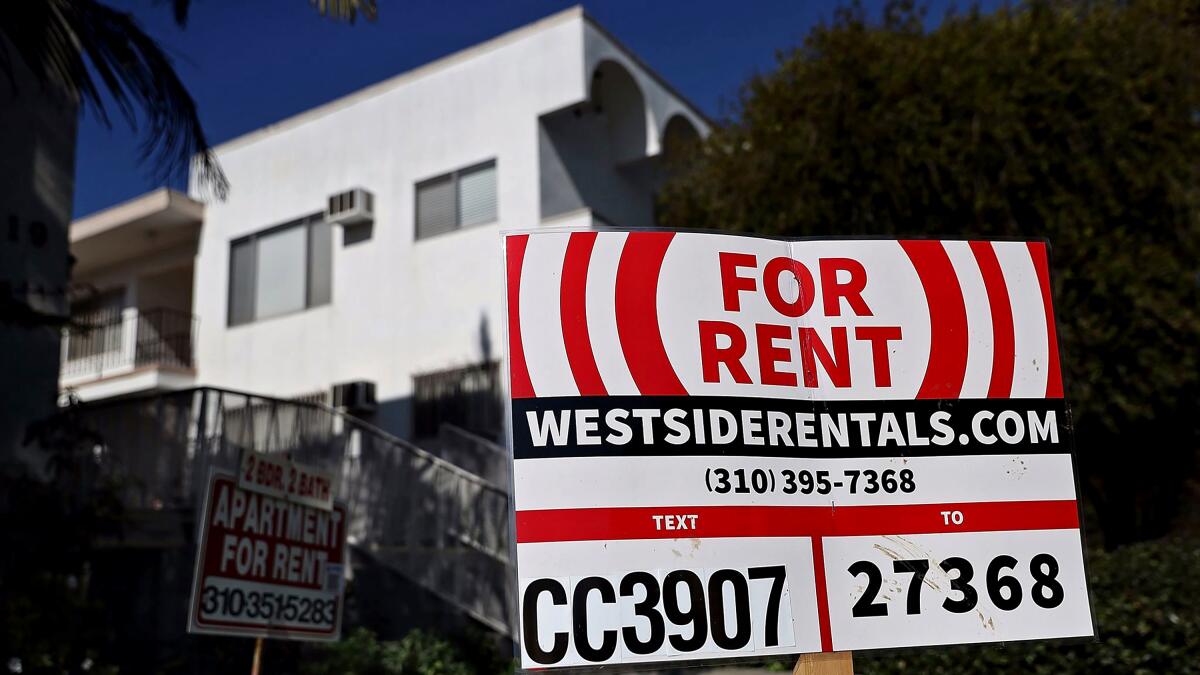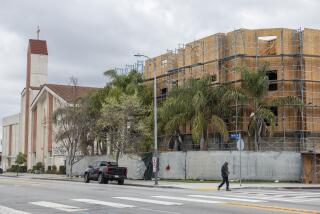Californians once again reject bid to expand rent control in the state

California voters have again decisively rejected a bid to expand rent control statewide.
The failure of Proposition 21 means that, once again, landlord groups have convinced voters that stricter limits on rent hikes are not a solution to California’s housing affordability problems. A statewide ban on most new forms of rent control will remain in effect.
“Yet again, California voters clearly understood the negative impacts Prop. 21 would have had on the availability of affordable housing in our state by clearly rejecting this radical ballot measure,” Tom Bannon, chief executive of the California Apartment Assn., said in a statement.
“It is now time to move from ballot-box battles and enact policies through the Legislature that allow the state to build more affordable housing that will once again make California an affordable place to live for our families.”
Proposition 21 was opposed by 59.8% of the voters, according to the state’s unofficial election tally Wednesday morning.
Landlords won a similar battle in 2018 when voters turned down the Proposition 10 rent control initiative. Like that campaign, total fundraising for Proposition 21 eclipsed $100 million. Landlord groups, notably large real estate investment trusts Essex Property Trust, Equity Residential and AvalonBay Communities, out-raised supporters of Proposition 21 more than 2 to 1. Nearly all the more than $40 million behind the Yes on 21 campaign came from the Los Angeles-based AIDS Healthcare Foundation, which similarly funded the failed 2018 initiative.
The rent control measures were aimed at addressing California’s sky-high housing costs, which force low-income and middle-class residents to spend significant shares of their income to keep a roof over their heads.
Home prices in Southern California hit record highs in September, and according to U.S. Census data, more than 56% of tenant families in California spend 30% or more of their income on rent, the level at which spending on housing hinders the ability to pay for other necessities.
While rents in many major metropolitan areas have fallen in the wake of the COVID-19 pandemic, millions have lost their jobs, leading to fears of mass evictions in the coming months.
Proposition 21 would not have offered any immediate relief to tenants struggling to pay their rent right now. Instead, it would have allowed cities and counties to implement stricter forms of rent control than they can now under the state’s Costa-Hawkins Rental Housing Act.
Proposition 21: Everything you need to know
The initiative would have modified the 25-year-old law to allow cities to control rents on apartments built after 1995, or earlier in cities that had rent control laws before Costa-Hawkins passed. Cities would still have been barred from implementing rent controls on apartments built within the last 15 years. Proposition 21 would also have allowed local governments to control rents on single-family homes and condominiums if they were owned by corporations or the owner had more than two properties. Lastly, the initiative would have allowed cities to limit rent hikes when eligible apartments became vacant — provided that landlords could receive at least a 15% increase.
Opponents argued against Proposition 21 as they did two years ago, contending that rent control would slow homebuilding and hurt the investments of small landlords.
Last year, in response to soaring rents, Gov. Gavin Newsom signed a law capping rent increases statewide at 5% plus inflation annually for most rental housing older than 15 years — one of the strongest policies of its kind in the country. Newsom cited that law in opposing Proposition 21.
Supporters of the initiative cited Newsom’s position against it, as well as the fact that they were significantly outspent, as reasons for the loss.
“We are disappointed, although not completely surprised, that Prop. 21 fell short at the ballot box tonight,” said René Moya, campaign director for Yes on 21.
Times staff writer Maloy Moore contributed to this story.
More to Read
Sign up for Essential California
The most important California stories and recommendations in your inbox every morning.
You may occasionally receive promotional content from the Los Angeles Times.









